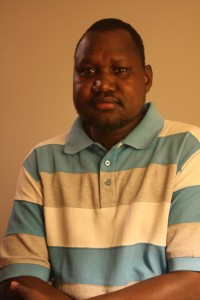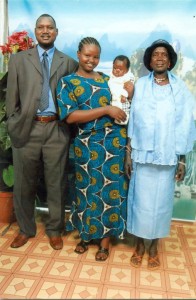
A civil war being fought on the other side of the world has hit home for one Unalaska resident. Mayak Bilkuei is from South Sudan, where ethnic and political violence have claimed up to 10,000 lives — including some of his own family.
It’s a cold and snowy winter day in Unalaska. Mayak Bilkuei is bundled up in a windbreaker over a thick sweatshirt and Xtratuf boots — practically the uniform at this fish processing plant.
Bilkuei: “This is where we work — inside this building, straight ahead. Yeah, it’s a big building.”
Bilkuei has worked at UniSea for a decade. Every winter, he takes off to see family. Bilkuei’s wife and son live in Nairobi, Kenya. He usually goes to visit them.
This year, Bilkuei wanted to go to South Sudan. But the political situation there was tense. The president and vice president were fighting, and soldiers in the national army were taking sides.
So Bilkuei flew to Kenya and waited for things to calm down.
Bilkuei: “Eventually war broke out in the capital of Southern Sudan, Juba. At that point, I couldn’t make it to South Sudan.
Bilkuei watched as the conflict spread like wildfire. Rebels broke off from the military and fought against it.
Some residents took up arms and formed militias. Old tribal conflicts that had quieted down after South Sudan became an independent country just two years ago, flared up again.
In late December, that fighting reached Panrieng — the remote county where Bilkuei’s family lives. It was a quiet time in their village.
Bilkuei: The young guys, they were not around because it was a farming area and nobody stayed there except the elder women.“
Bilkuei says a militia from an opposing tribe, the Nuer, has come to the village before to steal food and cattle. He believes the same group came back – this time, to fight.
Bilkuei: “So when they came in they started shooting people. At that time, they killed my mom and her twin sister and the other two sisters. Four of them.”
Another relative traveled up to the village to identify the bodies, and those of eight other family members.
He called Bilkuei in Kenya — where he was still on vacation — to break the news.
Bilkuei: “So when I heard that I was devastated. I didn’t know what to do. To go there? I’m not going to do anything. So I just called people and we went to church and we prayed. that was the only thing I did — just to go to church and pray.”
Bilkuei is back in Unalaska now, processing fish for UniSea. He still works 12-hour days, and comes home to a company apartment, just like before.
He still hasn’t heard from his surviving family — the men who were away from the village at a cattle camp when the militia came.
Bilkuei: “They have run far away. Nobody now in his own place, in his own house. They all run to the bush.”
The United Nations says a total of 700,000 people have fled their homes because of this war.
The U.N. and other aid groups are trying to do something about it. They pressured the rebels who broke away from the military to sign a ceasefire with the central government.
But it didn’t last long. They kept struggling for power, and the fighting started right back up again. Bilkuei says it’s not fair to civilians.
Bilkuei: “Those people who were killed, including my mom, she doesn’t even know that the government is functioning. He [sic] just know that he [sic] is living in a farming area. That is all she knows. And that there is God. But she doesn’t know that there is a government.”
The farming area, in Panrieng, is near South Sudan’s oil fields. Residents put up with pollution, and occasional violence from factions that want to control the oil. They don’t see any of the money from it.

But that land is still home. The last time his mother left the village — the last time he saw her — was about five years ago.
Bilkuei: “I brought my mother to Nairobi one time when my wife was going to deliver. You know, I called her to come and take care of her because I was not there. So she came to Nairobi and she stayed there for about six months. And then I left from here. I went there and then she said ‘Oh, I have to go back home.’”
When I ask him what he’s going to do — try to find his surviving relatives, or get them out of South Sudan — Bilkuei politely brushes the question aside.
Bilkuei: “You know, now, this is not a problem for my family right now. You know, this is a problem for everybody. The people that are being slaughtered, and they don’t know anything about it. It’s really very painful.”
“There’s nothing I can help now. But we need to speak out to [the] international community, anybody that could help. To just get the information out, of this place called Panrieng.”
That’s why Bilkuei is planning to travel there later this year. He wants to talk to people in the county and in his family’s village about what happened — take pictures, gather facts about the war. And then, he wants to bring their stories home.




